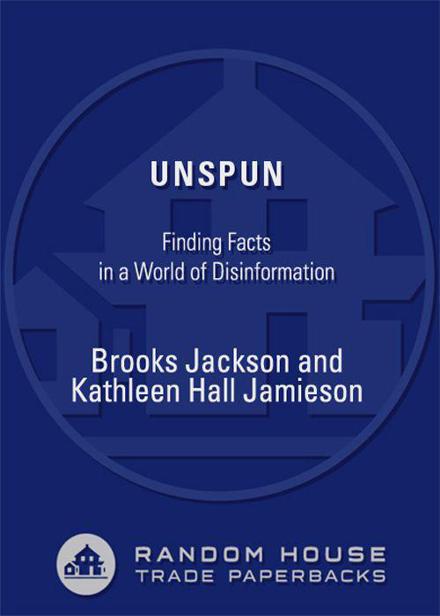
unSpun
Finding Facts in a World of Disinformation
- اطلاعات
- نقد و بررسی
- دیدگاه کاربران
نقد و بررسی

April 23, 2007
According to Jamieson and Jackson, both of the University of Pennsylvania's Annenberg Public Policy Center, "spin is a polite word for deception," and deception is everywhere. As a remedy, they offer this media literacy crash course. The authors explore spin's warning signs ("If it's scary, be wary") and the tricks used to bring people around to a certain point of view ("The implied falsehood," "Frame it and claim it"), as well as the lessons to call on when confronted with conflicting or suspect stories ("Extraordinary claims need extraordinary evidence"). Although they tackle the checkered history of product pitches (from snake oil to Cold-Eeze), what stands out is their keen insight into Washington politics, where "deception is a bipartisan enterprise," as illustrated by Bush and Kerry in the 2004 presidential election (in which both fudged the facts of unemployment and taxation). September 11 and the run-up to Gulf War II give the authors their most convincing talking points, debunking myths and chronicling Washington's use of "fear, uncertainty, and doubt"-cited so often it gets the acronym "FUD"-to generate public support for the 2003 invasion. However, the rules to avoid these and other carefully enumerated tricks range from commonsensical ("You can't be completely certain") to labor intensive ("Check primary sources"), leaving one to wonder whether the spin doctors have already won out over energy- and time-deficient Americans.

April 16, 2007
According to Jamieson and Jackson, both of the University of Pennsylvania's Annenberg Public Policy Center, "spin is a polite word for deception," and deception is everywhere. As a remedy, they offer this media literacy crash course. The authors explore spin's warning signs ("If it's scary, be wary") and the tricks used to bring people around to a certain point of view ("The implied falsehood," "Frame it and claim it"), as well as the lessons to call on when confronted with conflicting or suspect stories ("Extraordinary claims need extraordinary evidence"). Although they tackle the checkered history of product pitches (from snake oil to Cold-Eeze), what stands out is their keen insight into Washington politics, where "deception is a bipartisan enterprise," as illustrated by Bush and Kerry in the 2004 presidential election (in which both fudged the facts of unemployment and taxation). September 11 and the run-up to Gulf War II give the authors their most convincing talking points, debunking myths and chronicling Washington's use of "fear, uncertainty, and doubt"-cited so often it gets the acronym "FUD"-to generate public support for the 2003 invasion. However, the rules to avoid these and other carefully enumerated tricks range from commonsensical ("You can't be completely certain") to labor intensive ("Check primary sources"), leaving one to wonder whether the spin doctors have already won out over energy- and time-deficient Americans.
Copyright 2007 Library Journal, LLC Used with permission.




دیدگاه کاربران